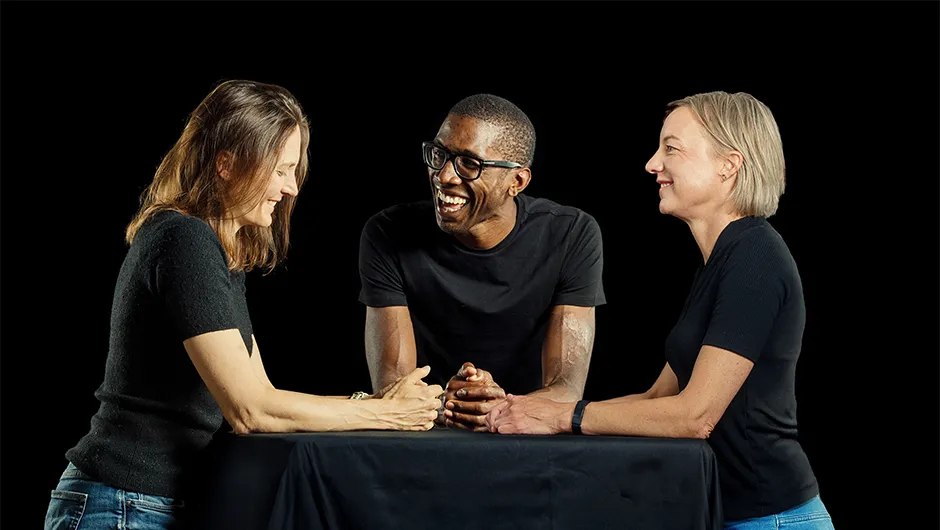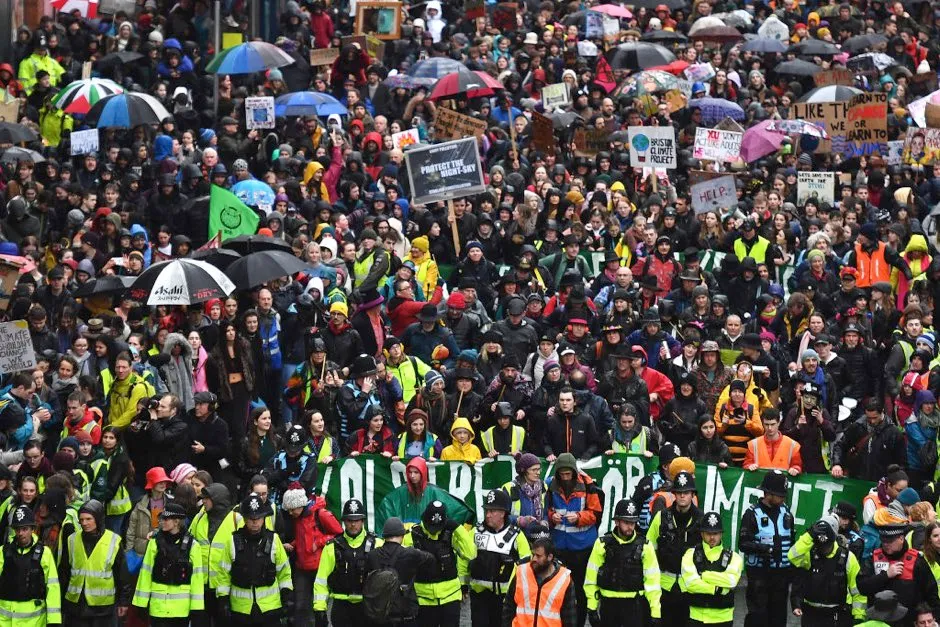The Royal Institution Christmas Lectures were started by Michael Faraday in 1825. They are now broadcast on national television every year, bringing scientists to our screens over three nights of the festive season.
The series of lectures has always been held in London, but this year, of course, is going to be slightly different.
The 2020 Christmas Lectures, titled Planet Earth: A User's Guide, are hosted by Professor Chris Jackson, Dr Helen Czerski and Dr Tara Shine.
- Lecture three airs tonight, 30 December, at 8pm on BBC Four. Catch up with lectures one and two on BBC iPlayer.
In the final lecture, environmental scientist Dr Tara Shine will talk about carbon emissions and what we're really breathing in. We spoke to Tara for an episode of the Science Focus Podcast, which you can listen to in full at the bottom of this page. Here's what Tara told us about being a 2020 Christmas Lecturer.

What’s in our atmosphere?
There are lots of things up there. Lots of naturally occurring things and then lots of gases that we're increasing the volume of over time through our activities.
Whether that's methane or nitrous oxide or levels of ozone, these are all elements that are up there in the atmosphere that affect the air that we breathe. Obviously, we don't stop to think that often about the air that we breathe. I guess we sort of take it for granted.
But it is things like air pollution and black carbon, which is in our atmosphere, that get us to think a little bit more about what are we breathing, and how they lead to people developing respiratory diseases and causing us ill health.
Those things are starting to make us think about the quality of the air. But it's only really if we experience something like a smog, poor air quality or wildfires like they've experienced in Australia or the West Coast of the US, that we really start to understand how important it is to have clean air.
The coronavirus pandemic has articulated that. If you're already living with compromised air quality, and that's having an effect on your respiratory system, then you're more vulnerable to viruses.
And this is as a result of human actions?
Yeah, in lots of different ways.
Sometimes it's because we're burning fossil fuels, sometimes it's because of how we are managing the land. Sometimes, it's the very fact that our combined activities are warming the global atmosphere up – for example, as permafrost starts to thaw it releases more methane.
Your power is really in how you share your actions, how you use your voice, how you use your leadership
Methane is a much more potent greenhouse gas than carbon dioxide, it has a much stronger warming potential. It doesn't hang around in the atmosphere as long, but while it's there, it's really causing a lot of warming.
All of the actions we doing, whether they're directly related to the burning of fossil fuels or how we manage the land, they're all having an impact.
What is the result of all this warming?
I don't want to give too much away, but I'll be speaking to somebody, as part of my lecture, who lives somewhere where they experience floods, very dangerous floods causing real hardship to the people in their country.
There are climate impacts nearly every day, but they just don't come through to us in the news. Quite often, while we're being distracted by Brexit or the elections in the United States, elsewhere in the world there are people, human beings like us, experiencing real hardship from from extreme weather events or just seasonal changes to their growing patterns. This will mean that they have less to eat or they're losing their home or their livelihood.
Every single day there are climate impacts to report. But we just don't hear about them all.
It must be hard to keep fighting, when you're aware of how much damage is being done each day.
Well, I'm an optimist, luckily, but even looking around at the impacts of climate change, any one of us could get to the point of feeling overwhelmed or despondent about the whole thing.
But I guess I have faith in human beings. I think we're logical creatures, and I think we do have empathy and we do care. So, although it might be taking a slightly longer than I would like for us to realise what we're doing, I think we will.
Read more positive climate stories :
- Airbus reveals zero-emission hydrogen plane concepts
- Biggest fall in carbon emissions from energy generation since 1990
- Apple: Tech giant to be carbon neutral by 2030
Another theme that we want to impart through the Christmas Lectures is how we can use human ingenuity, creativity and empathy to make things better.
I absolutely believe that we can make things better because I think it's in our own self-interest to do so.
After watching the Christmas Lectures, if we're fired up to do more to help look after the planet, what can we do next?
Lots of things! Quite often in the face of a really big, overwhelming problem, we can feel just that – overwhelmed and feel like there's no point and think, "what I do doesn't make a difference".
I would challenge that a little bit, not because your small individual actions are necessarily going to save the planet, but because the actions of many people really do count. And because you have an influence – each of us has an influence, particularly on our peers, on our friends, our family and on people in our community. They're going to really listen to you and respect what you say.
I think that if people are curious about the Earth that they live on, if they're curious about how things work, if they ask how and why, and they seek to get a better understanding of even the everyday objects in their house... they might ask, why are things disposable after one use? Why are some fuels so cheap in the world and others so expensive? What's behind all of that?
If you ask questions and you play your part, even in the small things, there's stuff you can do. Within your home, look at your kettle: it is one of the most energy intensive appliances in the house. If you boil it three times before you make a cup of tea, or fill it to the top every time you want to make one cup of tea, that seems like a small thing but actually has quite a big impact on your electricity bill.
Boiling the kettle accounts for 85 per cent of the carbon footprint of your cup of tea.
More small actions that can reduce your carbon footprint:
- Sir David Attenborough: How can we save our planet?
- How to reduce your carbon footprint for next to nothing
So, even these small things, they are having a direct impact on your life and on your pocket. But it's more about the collective sharing of those acts. Passing that hint on to somebody else so that they do it too, that's where your real power lies.
Your power is really in how you share your actions, how you use your voice, how you use your leadership. Whether that is as captain of your sports team or in your school or on your debating society. Whatever platform you have, that's what gives you power.
There are big impacts coming from organisational changes, too. What sort of initiatives are giving you hope for the future?
The United Kingdom will be the host of the 26th Conference of the Parties of the Climate Convention, and although it has been postponed for a year, it's still a really important point in time when that convention happens. It's when the countries come back five years, now six years, after the Paris Agreement to say, "this is what we've done and this is what we're going to do next."
They have to come back with bigger, bolder statements of intent around how they're going to take action on climate change. Even in this weird COVID year, there are more and more cities, companies, states and countries that are coming up with more ambitious climate commitments. They are putting their commitments to climate change in law, and are actually realising that they have to get to net zero emissions by the middle of the century.
So, I find that really heartening. That's important for us to know too, as we try and make changes in our own lives, that the change is happening at the larger scale. That's what systemic change is. Systemic change is going to be a top-down, bottom-up effort.
We can have a role in holding our own governments to account. We have a role in holding companies and big multinational corporations to account. So, being inquisitive about what they're doing and asking questions and using any power we have, whether it's our pockets or our voice on social media or with our friends, all of that is a way to contribute as well.

What do you say to people with their whole lives ahead of them, fighting this?
Well, a message that I give a lot to young people is I know sometimes it can feel like [previous generations have] just lumbered them with this big problem that we've caused and we've done nothing about it. But there are lots of boring older people like us, or maybe mildly interesting people like us, that have laid a lot of the groundwork.
Whether that's in the policies and the international conventions, or in figuring out how to make wind and solar energy at scale and at a cost that's less than coal and oil. A lot of this stuff is there, it really is the 'ramp up' moment right now. And that ramp up moment is really exciting.
Did you watch the Christmas Lectures as a child?
I lived in Ireland where we had just two television stations growing up, two Irish television stations. The BBC was something exotic that we got to see if I went to someone's house who happened to have parents who would pay extra money to have BBC. My dad certainly was not, so I didn't grow up with the Christmas Lectures.
This year Christmas Lectures are really interesting, because it isn't one lecturer with one perspective. It's three lecturers with shared and different perspectives, looking at our planet Earth in in a holistic way. To me, that's the excitement. It's the links between the different Earth processes and systems, and how we as human beings interact within those. That's really exciting.
And, within that, there's room for human beings creating new habits. And those habits can be pretty powerful.
Looking forward to 2021, what advice would you give to the lecturer, or lecturers, who follow in your footsteps?
I would say: think big.
The team that you work with is capable of pulling off big ideas – they think big.
Listen to more episodes of theScience Focus Podcast:
- Hannah Fry: How much of our lives is secretly underpinned by maths?
- Royal Institution Christmas Lectures past and present
- Sir David Attenborough: How can we save our planet?
- Christiana Figueres and Tom Rivett-Carnac: Has climate change determined our future?
- Everything you ever wanted to know about... the deep sea with Dr Jon Copley
- Mark Miodownik: Are biodegradable plastics really better than traditional plastic?
